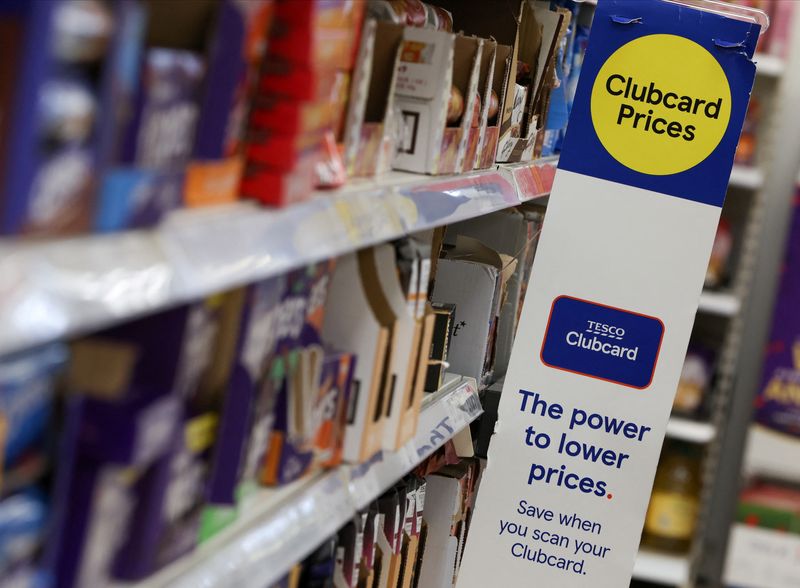
© Reuters. FILE PHOTO: Clubcard branding is seen inside a department of a Tesco Further Grocery store in London, Britain, February 10, 2022. Image taken February 10, 2022. REUTERS/Paul Childs/File Picture
2/2
By James Davey
LONDON (Reuters) -Britain’s antitrust regulator is launching a assessment of loyalty scheme pricing by supermarkets, akin to Tesco (OTC:)’s Clubcard and Sainsbury’s Nectar, to think about whether or not it’s truthful that cheaper costs can be found solely to members.
Loyalty schemes have proved massively profitable for the UK’s greatest supermarkets, providing a lot decrease costs for members.
The overwhelming majority of consumers now use the schemes and an rising variety of merchandise are coated by them.
Virtually 21 million UK households have a Tesco Clubcard and 80% of its gross sales contain them.
Tesco, which has a 27.4% share of the UK grocery market, presently provides over 8,000 merchandise by its Clubcard Costs scheme, whereas Sainsbury’s, which has a 15.2% share, has rolled out Nectar Costs to over 6,000 merchandise.
Sarah Cardell, CEO of the Competitors and Markets Authority (CMA), mentioned elevated use of the schemes meant worth promotions have been solely accessible to individuals who signed up for loyalty playing cards.
“This raises a number of questions about the impact of loyalty scheme pricing on consumers,” she mentioned on Wednesday.
The CMA’s assessment will start in January 2024.
Tesco and Sainsbury’s declined to remark. Shares in each have been flat in afternoon buying and selling.
UK meals worth inflation reached its highest since 1977 in March at greater than 19%, in keeping with official knowledge. By October it had slowed to 10.1%, however continues to be a serious pressure on the funds of many households.
The CMA had dominated in July that Britain’s excessive meals inflation had not been pushed by weak competitors amongst supermarkets.
Updating on its assessment of the entire sector, the regulator additionally mentioned it had discovered some branded suppliers had raised costs by greater than their prices elevated, however generally, buyers may discover cheaper own-label alternate options.
It famous that revenue margins had fallen throughout most branded producers since 2021, primarily due to decrease gross sales volumes as shoppers switched to cheaper alternate options.
The CMA did discover one space of concern, nonetheless, saying ineffective competitors within the child method market may very well be main to oldsters paying larger costs.
It plans to additional look at this market, the place costs have risen 25% in two years, as there was little proof that folks have been switching to cheaper child method merchandise and own-label alternate options.
The CMA famous two companies managed 85% of the UK child method market however didn’t title them. Knowledge from Euromonitor reveals they’re Danone and Nestle.
A spokesperson for Danone, the maker of Cow & Gate and Aptamil child method, mentioned it could proceed to have interaction with the CMA.
“In Danone’s experience the formula milk market is competitive. We are committed to best practices to maintain this,” the spokesperson mentioned.
A spokesperson for Nestle mentioned it welcomed the assessment.
“There have been significant increases in costs but we have been working to cut our costs wherever possible and only increase prices as a last resort,” the spokesperson mentioned.
The most recent section of the CMA’s assessment noticed it look at 10 product classes – child method, baked beans, bread, chilled desserts, lemonade, mayonnaise, milk, pet meals, poultry and prepared meals.

